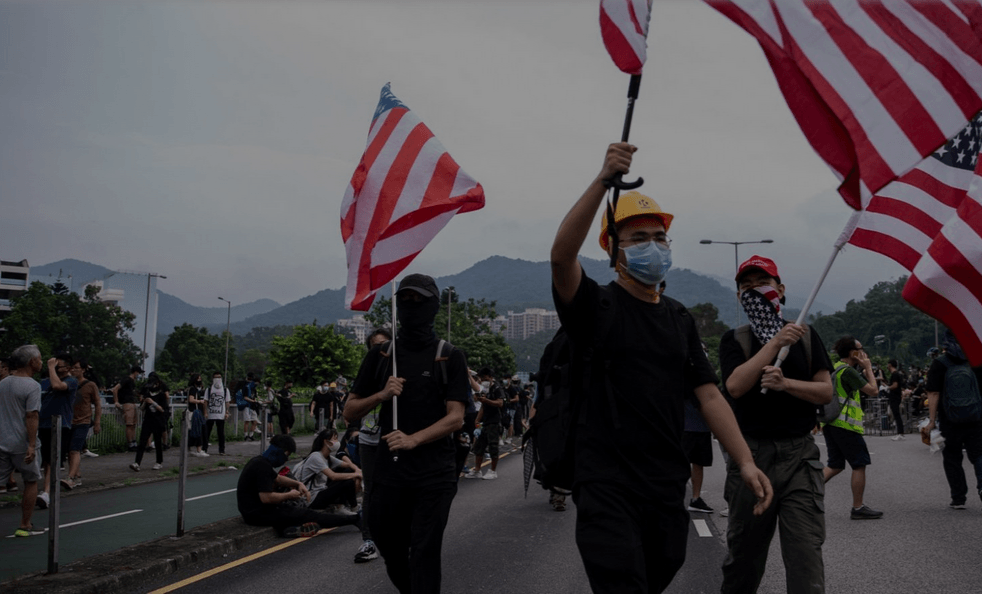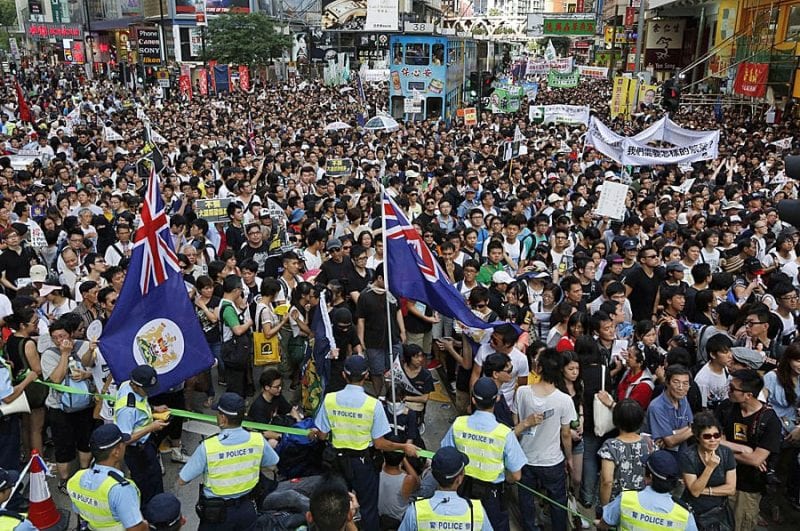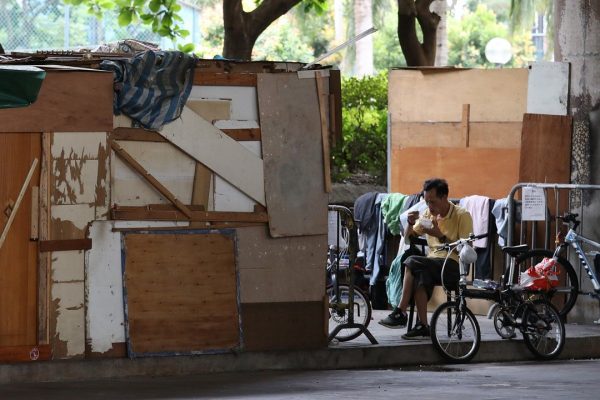Hong Kong in the Crosshairs of Global Power and Ideological Struggles
Kevin Zeese and Margaret Flowers
"The [real] source of unrest in Hong Kong is the economic insecurity stemming from capitalism. In 1997, Britain and China agreed to leave 'the previous capitalist system' in place for 50 years...."

Hong Kong protesters flying US flags, an obvious admission of their anti-China mentality and high Western influence.
[dropcap]H[/dropcap]ong Kong is one of the most extreme examples of big finance, neoliberal capitalism in the world. As a result, many people in Hong Kong are suffering from great economic insecurity in a city with 93 billionaires, second-most of any city.
Hong Kong is suffering the effects of being colonized by Britain for more than 150 years following the Opium Wars. The British put in place a capitalist economic system and Hong Kong has had no history of self-rule. When Britain left, it negotiated an agreement that prevents China from changing Hong Kong’s political and economic systems for 50 years by making Hong Kong a Special Administrative Region (SAR).
China cannot solve the suffering of the people of Hong Kong. This ‘One Country, Two Systems’ approach means the extreme capitalism of Hong Kong exists alongside, but separate from, China’s socialized system. Hong Kong has an unusual political system. For example, half the seats in the legislature are required to represent business interests meaning corporate interests vote on legislation.
Hong Kong is a center for big finance and also a center of financial crimes. Between 2013 and 2017, the number of suspicious transactions reported to law enforcement agencies rocketed from 32,907 to 92,115. There has been a small number of prosecutions, which dropped from a high of 167 in 2014 to 103 in 2017. Convictions dropped to only one person sentenced to more than six years behind bars in 2017.
The problem is neither the extradition bill that was used to ignite protests nor China, the problems are Hong Kong’s economy and governance.
The Extradition Bill
The stated cause of the recent protests is an extradition bill proposed because there is no legal way to prevent criminals from escaping charges when they flee to Hong Kong. The bill was proposed by the Hong Kong government in February 2019 to establish a mechanism to transfer fugitives in Hong Kong to Taiwan, Macau or Mainland China.
Extradition laws are a legal norm between countries and within countries (e.g. between states), and since Hong Kong is part of China, it is pretty basic. In fact, in 1998, a pro-democracy legislator, Martin Lee, proposed a law similar to the one he now opposes to ensure a person is prosecuted and tried at the place of the offense.
The push for the bill came in 2018 when a Hong Kong resident Chan Tong-kai allegedly killed his pregnant girlfriend, Poon Hiu-wing, in Taiwan, then returned to Hong Kong. Chan admitted he killed Poon to Hong Kong police, but the police were unable to charge him for murder or extradite him to Taiwan because no agreement was in place.

Hong Kong protest. The numbers ebb and flow, but most people are simply misguided or outright in the service of foreign propaganda entities, like the US NED. And a lot of the problems are not caused by Beijing but by their own extreme capitalist regime. (Click to expand.)
The proposed law covered 46 types of crimes that are recognized as serious offenses across the globe. These include murder, rape, and sexual offenses, assaults, kidnapping, immigration violations, and drug offenses as well as property offenses like robbery, burglary and arson and other traditional criminal offenses. It also included business and financial crimes.
Months before the street protests, the business community expressed opposition to the law. Hong Kong’s two pro-business parties urged the government to exempt white-collar crimes from the list of offenses covered by any future extradition agreement. There was escalating pressure from the city’s business heavyweights. The American Chamber of Commerce, AmCham, a fifty-year-old organization that represents over 1,200 US companies doing business in Hong Kong, opposed the proposal.
AmCham said it would damage the city’s reputation:
“Any change in extradition arrangements that substantially expands the possibility of arrest and rendition … of international business executives residing in or transiting through Hong Kong as a result of allegations of economic crime made by the mainland government … would undermine perceptions of Hong Kong as a safe and secure haven for international business operations.”
Kurt Tong, the top US diplomat in Hong Kong, said in March that the proposal could complicate relations between Washington and Hong Kong. Indeed, the Center for International Private Enterprise, an arm of NED said the proposed law would undermine economic freedom, cause capital flight and threaten Hong Kong’s status as a hub for global commerce. They pointed to a bipartisan letter signed by eight members of Congress, including Senators Marco Rubio, Tom Cotton, and Steve Daines and Members of the House of Representatives, Jim McGovern, Ben McAdams, Chris Smith, Tom Suozzi, and Brian Mast opposing the bill.
Proponents of the bill responded by exempting nine of the economic crimes and made extradition only for crimes punishable by at least seven years in prison. These changes did not satisfy big business advocates.
The Mass Protests and US Role
From this attention to the law, opposition grew with the formation of a coalition to organize protests. As Alexander Rubinstein reports,
“the coalition cited by Hong Kong media, including the South China Morning Post and the Hong Kong Free Press, as organizers of the anti-extradition law demonstrations is called the Civil Human Rights Front. That organization’s website lists the NED-funded HKHRM [Human Rights Monitor], Hong Kong Confederation of Trade Unions, the Hong Kong Journalists Association, the Civic Party, the Labour Party, and the Democratic Party as members of the coalition.”
HKHRM alone received more than $1.9 million in funds from the NED between 1995 and 2013. Major protests began in June.
Building the anti-China movement in Hong Kong has been a long-term, NED project since 1996. In 2012, NED invested $460,000 through its National Democratic Institute, to build the anti-China movement (aka pro-democracy movement), particularly among university students. Two years later, the mass protests of Occupy Central occurred. In a 2016 Open Letter to Kurt Tong, these NED grants and others were pointed out and Tong was asked if the US was funding a Hong Kong independence movement.
During the current protests, organizers were photographed meeting with Julie Eadeh, the political unit chief of US Consulate General, in a Hong Kong hotel. They also met with China Hawks in Washington, DC including Vice President Pence, Secretary of State Pompeo, National Security Adviser John Bolton, Senator Marco Rubio and Rep. Eliot Engel, chairman of the House Foreign Affairs Committee. Larry Diamond, a co-editor of the NED’s publication and a co-chair of research, has been openly encouraging the protesters. He delivered a video message of support during their rally this weekend.
Protests have included many elements of US color revolutions with tactics such as violence — attacks on bystanders, media, police and emergency personnel. Similar tactics were used in Ukraine, Nicaragua, and Venezuela, e.g. violent street barricades. US officials and media criticized the government’s response to the violent protests, even though they have been silent on the extreme police violence against the Yellow Vests in France. Demonstrators also use swarming techniques and sophisticated social media messaging targeting people in the US.
Mass protests have continued. On July 9, Chief Executive Carrie Lam pronounced the bill dead and suspended it. Protesters are now calling for the bill to be withdrawn, Lam to resign and police to be investigated. For more on the protests and US involvement, listen to our interview with K. J. Noh on Clearing the FOG (available on Monday).
What Is Driving Discontent in Hong Kong?
The [real] source of unrest in Hong Kong is the economic insecurity stemming from capitalism. In 1997, Britain and China agreed to leave “the previous capitalist system” in place for 50 years.
Hong Kong has been ranked as the world’s freest economy in the Heritage’s Index of Economic Freedom since 1995 when the index began. In 1990, Milton Friedman described Hong Kong as the best example of a free-market economy. Its ranking is based on low taxes, light regulations, strong property rights, business freedom, and openness to global commerce.
Graeme Maxton writes in the South China Morning Post:
“The only way to restore order is through a radical change in Hong Kong’s economic policies. After decades of doing almost nothing, and letting the free market rule, it is time for the Hong Kong government to do what it is there for; to govern in the interests of the majority.”
The issue is not the extradition proposal, Carrie Lam or China. What we are witnessing is an unrestricted neo-liberal economy, described as a free market on steroids. Hong Kong’s economy relative to China’s gross domestic product (GDP) has fallen from a peak of 27 percent in 1993 to less than 3 percent in 2017. During this time, China has had tremendous growth, including in nearby market-friendly Shenzen, while Hong Kong has not.
“For the last 10 years wages have been stagnant in Hong Kong while rents have increased 300 percent; it is the most expensive city in the world. In Shenzhen, wages have increased 8 percent every year, and more than 1 million new, public, green housing units at low rates are nearing completion.”
Hong Kong has the world’s highest rents, a widening wealth gap and a poverty rate of 20 percent. In China, the poverty rate fell from 88 percent in 1981 to 0.7 percent in 2015, according to the World Bank.
Hong Kong In The Chinese Context
Ellen Brown writes in “Neoliberalism Has Met Its Match in China,” that the Chinese government owns 80 percent of banks, which make favorable loans to businesses, and subsidizes worker costs. The US views China subsidizing its economy as an unfair trade advantage, while China sees long-term, planned growth as smarter than short-term profits for shareholders.
The Chinese model of state-controlled capitalism (some call it a form of socialism) has lifted 800 million people out of poverty and built a middle class of over 420 million people, growing from four percent in 2002, to 31 percent. The top twelve Chinese companies on the Fortune 500 are all state-owned and state-subsidized including oil, solar energy, telecommunications, engineering, construction companies, banks, and the auto industry. IMF and World Bank.
China does have significant problems. There are thousands of documented demonstrations, strikes and labor actions in China annually, serious environmental challenges, inequality and social control through the use of surveillance technology. How China responds to these challenges is a test for their governance.
China describes itself as having an intraparty democracy. The eight other legal “democratic parties” that are allowed to participate in the political system cooperate with but do not compete with the Communist Party. There are also local elections for candidates focused on grassroots issues. China views western democracy and economics as flawed and does not try to emulate them but is creating its own system.
China is led by engineers and scientists, not by lawyers and business people. It approaches policy decisions through research and experimentation. Every city and every district is involved in some sort of experimentation including free trade zones, poverty reduction, and education reform. “There are pilot schools, pilot cities, pilot hospitals, pilot markets, pilot everything under the sun, the whole China is basically a giant portfolio of experiments, with mayors and provincial governors as Primary Investigators.” In this system, Hong Kong could be viewed as an experiment in neoliberal capitalism.
The Communist Party knows that to keep its hold on power, it must combat inequalities and shift the economy towards a more efficient and more ecological model. Beijing has set a date of 2050 to become a “socialist society” and to achieve that, it seeks improvements in social, labor and environmental fields.
Where does Hong Kong fit into these long-term plans? With 2047 as the year for the end of the agreement with the UK, US and western powers are working toward preserving their capitalist dystopia of Hong Kong and manufacturing consensus for long-term conflict with China.
How this conflict of economic and political systems turns out depends on whether China can confront its contradictions, whether Hong Kongers can address the source of their problems and whether US empire can continue its dollar, political and military dominance. Today’s conflicts in Hong Kong are rooted in all of these realities.
Feel free to distribute (Plus on est de fous...)
 SELECT COMMENTS FROM ORIGINAL THREAD
SELECT COMMENTS FROM ORIGINAL THREAD
Good point. China sees what is going on. They are well aware of UK and US funding of an anti-China movement in the guise of a pro-democracy movement or an anti-extradition movement or whatever other opportunities come up to attack China in the future. As a result, Hong Kong is of shrinking importance to China. China is investing heavily in Shenzhen to make it a model city that will replace Hong Kong in importance. By the time we get to 2047, Hong Kong will be a tiny part of China's GDP and not all that relevant. China will be able to deal with US/UK efforts to make it independent of China without much worry. It wil lnot be good for the people of Hong Kong, but they are getting in bed with the US and UK and will be the price with a return to being dominated by the west. I hope they break with the US/UK and ally with China as that would be best for the people of Hong Kong.
https://www.scmp.com/video/...
All animals are equal but some animals are more equal than others,’ an apposite description of state capitalist China which has over 100 billionaires. Together they have wealth equal to twice Ireland’s GDP! According to a Peking University report from 2016, the income disparity is getting worse with the top 1 percent owning a third of the country’s wealth and the bottom 25 percent of the population just 1 percent. The 99% never voted for this!
Capitalist hallmarks, such as class society, commodity production, profit motive, exploitation of wage labour, markets, etc., are found worldwide, including China and Hong Kong.
Yes. This is especially true in Hong Kong because it is a capitalist dystopia created by the UK when it colonized Hong Kong and put in stone for 50 years in the agreement to return Hong Kong to China. China cannot change the Hong Kong system and the Hong Kong system is failing in comparison to the state-controlled economic policy of China.
Is there any attempt to shift wealth back to workers on either side of this struggle?
I think not.
Acknowledging the truth contained herein, still, when as much as 1/4
of the population comes out on a rainy day to protest, that magnitude
says something of the class character of the protest. It seems to me
that lack of trust that this extradition law would not be used against
any type of political protest is what fuels it. I doubt that there
would be this huge a crowd to protect economic crimes or run of the
mill criminal behavior. Jon
Don't be fooled by these protests. They are attacking the wrong target. If they want democracy, only the Hong Kong government can give it to them. Mainland China is not able to change the Hong Kong government or economy.
The extradition law was not a big deal. It was very limited in that it focused on people accused of offenses that could be impisoned by at least 7 years. The business lobby in Hong Kong opposed it because they control the Hong Kong government and therefore are not held accountable. Extradition could lead to them being prosecuted for business and finance crimes.
The US-funded NGOs that organized these protests are really anti-China groups wearing a disguise of pro-democracy or anti-extradition. The real purpose is to demonize China because the US national security strategy is 'great power conflict' and that means conflict with China. The protests, with professionally made signs in English, are designed to manufacture consent for escalating conflict with China.

This work is licensed under a Creative Commons Attribution-NonCommercial 4.0 International License

